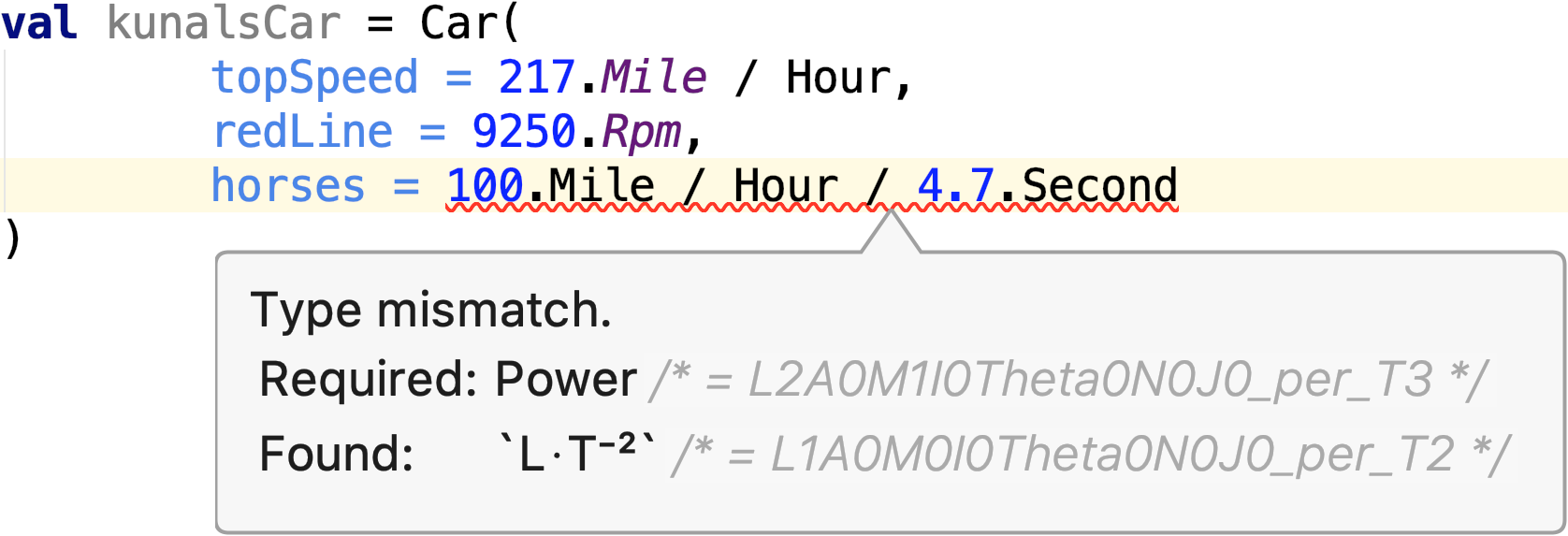units-of-measure alternatives and similar libraries
Based on the "Misc" category.
Alternatively, view units-of-measure alternatives based on common mentions on social networks and blogs.
-
jclasslib
jclasslib bytecode editor is a tool that visualizes all aspects of compiled Java class files and the contained bytecode. -
kotlin-logging
Lightweight Multiplatform logging framework for Kotlin. A convenient and performant logging facade. -
lingua
The most accurate natural language detection library for Java and the JVM, suitable for long and short text alike -
Kotlift
DISCONTINUED. Kotlift is the first source-to-source language transpiler from Kotlin to Swift -
Humanizer.jvm
Humanizer.jvm meets all your jvm needs for manipulating and displaying strings, enums, dates, times, timespans, numbers and quantities. -
klutter
A mix of random small libraries for Kotlin, the smallest reside here until big enough for their own repository. -
kassava
This library provides some useful kotlin extension functions for implementing toString(), hashCode() and equals() without all of the boilerplate. -
solr-undertow
Solr / SolrCloud running in high performance server - tiny, fast startup, simple to configure, easy deployment without an application server. -
SimpleDNN
SimpleDNN is a machine learning lightweight open-source library written in Kotlin designed to support relevant neural network architectures in natural language processing tasks -
kotlin-futures
A collections of extension functions to make the JVM Future, CompletableFuture, ListenableFuture API more functional and Kotlin like. -
kasechange
🐫🐍🍢🅿 Multiplatform Kotlin library to convert strings between various case formats including Camel Case, Snake Case, Pascal Case and Kebab Case -
PrimeCalendar
PrimeCalendar provides all of the java.util.Calendar functionalities for Persian, Hijri, and ... dates. It is also possible to convert dates to each other.
InfluxDB - Power Real-Time Data Analytics at Scale

* Code Quality Rankings and insights are calculated and provided by Lumnify.
They vary from L1 to L5 with "L5" being the highest.
Do you think we are missing an alternative of units-of-measure or a related project?
README
units-of-measure
Type-safe dimensional analysis and unit conversion in Kotlin.

Project Status
Stable and safe for production.
Building UOMs for the first time is quite slow on the latest Kotlin compiler versions (1.3.70+). To improve compile times, UOMs 7.0.0+ will be repackaged as an Λrrow Meta plugin.
Usage
Take a look at the project website for installation and usage: http://units.kunalsheth.info
You can also take a look at this sample project for a complete gradle setup and to learn about some of the more advanced features.
val mass1 = 3.kilo(Gram)
val mass2 = 14.Ounce
val sum = mass1 + mass2
// mass1 + 3.Days // will not compile
assert(sum in 7.5.Pound `±` 1.Ounce)
assert(sum in 3.3.kilo(Gram)..7.5.Pound) // this works too
// assert(sum in 7.4.Kilowatts..7.5.Pounds) // will not compile
val ratio = 2.Foot / 1.Metre
assert(ratio in 60.Percent `±` 5.Percent)
assert(ratio.Percent.toInt() in 55..65)
assert(1.kilo(Gram) == 1000.Gram)
assert(10.milli(Metre) == 1.centi(Metre))
assert(60000.milli(Second) == 1.Minute)
assert(420.Degree % 1.Turn in 60.Degree `±` 1.Degree)
val speed = 65.Mile / Hour
val time = 27.Minute
val distance = speed * time
val aBitFaster = distance / (time - 30.Second)
assert(distance == time * speed)
assert(distance in 29.Mile..30.Mile)
assert(distance in 30.Mile..29.Mile) // this works too
assert(aBitFaster in speed..(speed + 4.kilo(Metre) / Hour))
val threshold = 0.001.Foot / Second / Second
sequenceOf(0, 1, 4, 9, 16, 25).map { it.Foot }
.derivative(::p)
.derivative(::p)
.zipWithNext { a, b -> a in b `±` threshold }
.forEach { assert(it) }
// support for generic programming
fun <Q : Quan<Q>, DQDT : Quan<DQDT>> Sequence<Q>.derivative(p: (Q, `÷`, T) -> DQDT) = timeSeq()
.zip(this)
.zipWithNext { (x1, y1), (x2, y2) -> p(
(y1 - y2), `÷`, (x1 - x2)
) }
Background
Type-safe dimensional analysis and unit conversion can be extremely beneficial to a team. From personal experience, using type-safe calculations result in:
- Faster Development — IDE autocomplete provides meaningful predictions, rather than just listing every number in scope.
- Cleaner Code — Variable names will be of a reasonable length now that unit information is documented by the type.
- Higher Confidence — All unit/dimension related bugs will show up at compile time. Debugging is less difficult and time-consuming.
units-of-measure's novel, metaprogramming approach to the problem makes it: 1) Incredibly Extendable — Adding new functionality is as simple as adding a line to your build file. No tedious "hand-coding" is required. 2) Small — You only generate what you need. You are not forced to bundle every conceivable unit, quantity, and dimension with your app. 3) Bug Resistant — Programming by hand is error prone and time-consuming. Code generation can ensure correctness.
Todo List
- [x] Make it work.
- [x] Generate implicit relationships as well.
- [x] Make annotations easier to write and manage.
- [x] Add support for unit conversions.
- [x] Add docs. (http://units.kunalsheth.info)
- [x] Add metric prefixes.
- [x] Multiplatform.
- [x] Stronger support for generic use (
Quantity<This, IntegralOfThis, DerivativeOfThis>) - [x]
*and÷singleton types for even safer proof-passing. - [x] Publish on Gradle Plugin Portal.
- [ ] Document serialization functionality.
- [ ] Optimize for faster compilation and runtime.
- [ ] Benchmark performance hit in contrast to primitives. (Can someone help me with this?)

